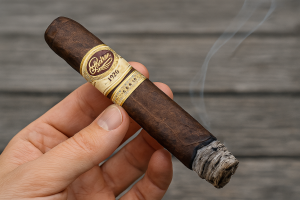How Can I Be Sure I'm Buying Authentic Cuban Cigars - Complete Real vs. Fake Checklist

Authentic Cuban cigars are well-known for their exceptional quality and rich history, a symbol of luxury and craftsmanship in the world of premium tobacco. Originating from the fertile lands of Cuba, these cigars are celebrated for their distinctive flavors and meticulous construction.
However, the high demand for Cuban cigars has led to an influx of counterfeits in the market, making it crucial for aficionados to know how to distinguish genuine products from fakes.
This guide aims to show you how to spot fake Cuban cigars, preserving the integrity of your smoking experience.
Steps to Identify Genuine Cuban Cigars with Ease
By familiarizing yourself with the characteristics of both authentic and forged products, you will learn how to identify genuine Cuban cigars and ensure a proper smoking adventure.
|
Authentic Cuban Cigars |
Counterfeit Cuban Cigars |
|
|
Government Seal |
Intact, holographic seal with watermark |
Missing, tampered, or non-holographic |
|
Cap Construction |
Neatly applied with three seams |
Poorly applied, often with fewer seams |
|
Box Codes |
Clear, stamped codes indicating factory and date |
Smudged, missing, or incorrect |
|
Wrapper Quality |
Smooth, uniform in color, and without flaws |
Uneven color, visible defects |
|
Band Details |
Crisp, detailed, with proper alignment |
Blurred details, misaligned |
|
Aroma |
Rich, complex without chemical notes |
Dull or unnatural aromas |
|
Ash Color |
Consistently gray, indicating pure tobacco |
Dark ash, indicating impure tobacco |
|
Price |
$15 to $50 per cigar |
Under $10 per cigar |
|
Burn Line Consistency |
Even, self-correcting burn |
Uneven burn, frequent touch-ups needed |
|
Flavor Profile Development |
Balanced, nuanced flavors |
Monotonous, harsh flavors |
Government Seal Integrity
Genuine cigars are protected by a government-issued holographic seal with a watermark, placed on the box to signify authenticity. This seal is a security measure implemented by Habanos S.A., the Cuban cigar distribution company, to combat counterfeit products.
Counterfeit cigars, meanwhile, often lack this holographic seal, or they may appear tampered with, lacking the detailed holography and watermark of the genuine seal.
Cap Construction Excellence
The cap of an authentic cigar is a testament to the skilled craftsmanship involved in its creation, featuring a neatly applied triple seam. This intricate construction detail ensures both the cigar's aesthetic appeal and its functional integrity.
In contrast, counterfeit versions typically exhibit poorly executed caps, which may have irregular seams or lack the characteristic triple-seam entirely. The cap's construction quality can often reveal the overall care and authenticity put into the cigar's production.
Box Codes Clarity
Real cigars come in boxes that bear clear, stamped codes indicating the factory and date of production. These codes are crucial for traceability and verification, allowing aficionados to confirm the cigars' origin and manufacture date.
Counterfeit cigars may present smudged, missing, or incorrect box codes, making it challenging to verify their authenticity and potentially indicating a lack of genuine origin.
Wrapper Quality and Appearance
The wrapper of a real cigar is characterized by its smooth texture and uniform color, free of significant flaws. This quality reflects the high standards of tobacco selection and cigar production in Cuba.
Counterfeit cigars, however, often have wrappers with uneven coloration, visible defects, or a texture that deviates from the smoothness expected of a premium cigar, indicating inferior tobacco or craftsmanship.
Band Details Precision
The bands on Cuban cigars are designed with crisp details and proper alignment, featuring intricate designs that are specific to each brand and vitola. These bands are carefully applied to ensure they meet the high standards associated with cigar making.
Blurred details or misalignment in the band design are common indicators of counterfeit cigars, as these flaws suggest a lack of attention to the precision and quality control inherent in the production of originals.
Aroma Authenticity
Before lighting, a real cigar emits a rich and complex aroma, devoid of any chemical undertones. This pre-light aroma is inviting and indicative of the natural aging process and quality tobacco used in Cubans.
Counterfeit cigars may have a dull or unnatural aroma, sometimes even presenting chemical notes, which detract from the expected sensory experience and signal potential authenticity issues.
Ash Color and Structure
The ash of genuine cigars is consistently gray, indicating the purity of the tobacco. It holds its shape well, showcasing the cigar's solid construction and the uniformity of the tobacco blend.
Dark or flaky ash in counterfeit cigars suggests the use of impure or mixed tobacco, diverging from the high-quality standards set by authentic cigar manufacturers.
Price Comparison
Genuine Cuban cigars are priced to reflect their heritage, craftsmanship, and the quality of materials used, usually ranging from $15 to $50 per cigar, depending on the specific vitola and its rarity.
Significantly lower prices, often under $10, are a red flag, suggesting that the cigars may be counterfeit and not meet the high standards of authentic cigar production.
Burn Line Consistency
An even and consistent burn line is characteristic of a well-constructed Cuban, ensuring a smooth smoking experience. This consistency reflects the precision with which the cigar has been rolled and the quality of the tobacco blend.
Uneven burns, requiring corrections, are often observed in counterfeit products, highlighting issues in construction and the possible use of inferior tobacco blends.
Flavor Profile Development
Authentic cigars are celebrated for their balanced and nuanced flavor profiles, which develop beautifully throughout the smoking experience. This complexity is a hallmark of the expert blending and aging processes used in Cuban cigar production.
Counterfeit cigars may offer a monotonous or harsh flavor profile, lacking the depth and evolution of flavors that are characteristic of real cigars.
Conducting a Final Cuban Cigar Verification Test
In the pursuit of genuine Cuban cigars, aficionados must undertake a meticulous examination process, especially when acquiring new cigars. This cigar authenticity verification not only safeguards your investment but also ensures the integrity of your smoking experience.
Here’s a detailed breakdown of the steps involved in this critical assessment:
- Box Codes: Genuine cigar boxes are marked with clear, precise codes that denote the factory of origin and the production date. These codes are a direct link to the cigar's heritage, offering a traceable history that aficionados can verify.
- Government Seal: The holographic government seal, complete with a watermark, is a critical security feature on original boxes. The presence and condition of this seal are paramount in confirming that the cigars have passed through the official channels of distribution and meet stringent quality standards.
- Wrapper Quality: Authentic cigars are known for their impeccable wrappers, which should be smooth and uniform in color. The wrapper's quality is a direct reflection of the care and selection process of the tobacco leaves, with real cigars showcasing a flawless appearance devoid of major blemishes or inconsistencies.
- Construction Uniformity: From the evenly dense roll to the neatly applied triple cap, each aspect of the cigar's construction should exude precision and uniformity. The cap, in particular, is applied with a technique that is distinctive to originals, featuring three perfectly executed seams that seal the cigar's head.
- Scannable Bar Code: Contemporary cigar boxes are equipped with a bar code that can be scanned to authenticate the cigars through the official Habanos S.A. database.
By meticulously following these detailed steps, cigar enthusiasts can confidently discern original cigars from counterfeits.
A Journey Through Time and Tradition
Cuban cigars represent a legacy of unmatched excellence and a deep-rooted history that transcends the mere act of smoking. When you verify the authenticity of your cigars, you pay homage to a centuries-old craft, showcasing a commitment to quality that has been handed down through generations.
The history of these premium cigars is as layered and complex as the flavors they possess. Beginning in the 15th century, when Christopher Columbus first encountered tobacco in the New World, to the establishment of Cuba as the pinnacle of cigar production in the 19th century, Cuban cigars have been revered globally.
The rituals, techniques, and traditions of cigar-making have been preserved and refined over time, standing as a testament to the dedication and passion of the Cuban people for their most famous export.
We invite you to explore our curated selection of original Cuban cigars, where history meets quality in every draw. Celebrate with Online Cigars the rich heritage and vibrant future of these premium cigars, and experience firsthand the artistry and elegance that can only be found in a true Cuban cigar.















